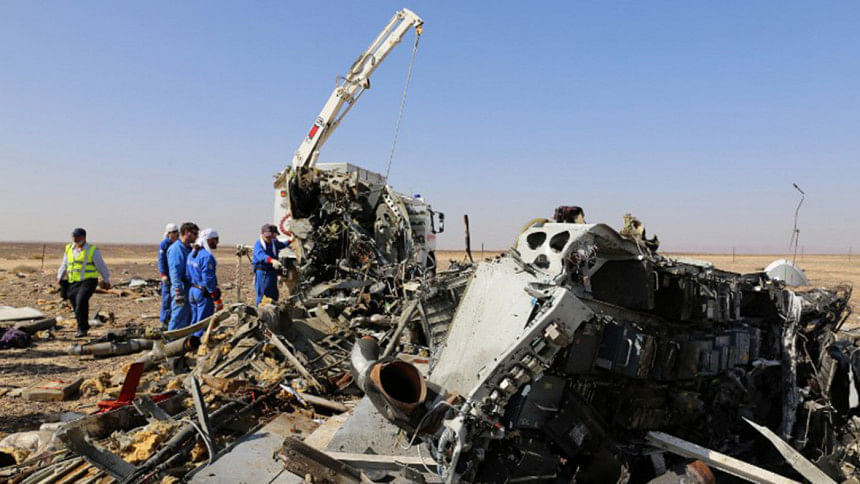Bomb 'may have caused Egypt jet crash'

Intelligence suggests the Russian plane that crashed in Egypt killing all 224 people on board may have been brought down by a bomb, US and UK officials say.
But they say they have yet to reach a formal conclusion.
Britain earlier suspended flights to and from the resort of Sharm el-Sheikh, from where the flight had departed.
Egypt has dismissed claims by militants linked to Islamic State (IS) that they brought down the plane.
Russian experts say it is too early to say.
Separately on Wednesday, Egyptian officials said the cockpit voice recorder of the Metrojet Airbus 321 was badly damaged in the crash.
However, they managed to extract information from the flight data recorder which is ready to be analysed by investigators, Egypt's Civil Aviation Minister Mohamed Hossam Kamal said.
The plane, bound for St Petersburg, crashed in Egypt's Sinai desert just 23 minutes after take-off from Sharm el-Sheikh on Saturday.
Most of those on board the plane, which was operated by Russian airline Kogalymavia, were Russian.
"We have concluded that there is a significant possibility that the crash was caused by an explosive device on board the aircraft," UK Foreign Secretary Philip Hammond told reporters after the government's crisis response committee met late on Wednesday.
He said Britain was suspending all flights to and from Sharm el-Sheikh indefinitely and UK nationals already there would be helped to leave once extra security measures were put in place.
The move came during a visit to Britain by Egyptian President Abdul Fattah al-Sisi and Hammond stressed that the decision to suspend flights was made "very reluctantly", adding: "We have to put the safety and security of British nationals above all other considerations."
Earlier, Prime Minister David Cameron's office said UK aviation experts had been sent to Sharm el-Sheikh to assess the security situation there.
Egyptian Foreign Minister Sameh Shoukry called the UK response premature and unwarranted, telling the BBC that Egypt had taken "exceptional measures" to enhance security at Sharm el-Sheikh airport.
Security concerns and the Sinai plane crash are expected to be high on the agenda when Cameron and President Sisi hold talks on Thursday.
An unnamed US official told the Associated Press news agency they had reached the "tentative conclusion", after intercepting communications, that an IS affiliate in the Sinai peninsula had planted an explosive device on the plane.
"A bomb is a highly possible scenario," another US official told the AFP news agency.
But the officials stressed that forensic evidence, including the flight recorders, was still being analysed.
On Tuesday, US media reported that a military satellite had detected a "heat flash" over the Sinai at the time of the crash.

 For all latest news, follow The Daily Star's Google News channel.
For all latest news, follow The Daily Star's Google News channel. 



Comments